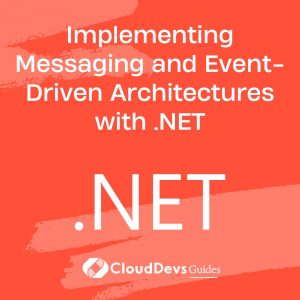Exploring Blockchain Development with .NET and Ethereum
Table of Contents
Blockchain technology, particularly Ethereum, has revolutionized the way we think about decentralized applications and smart contracts. Leveraging the .NET ecosystem for Ethereum development allows developers to harness a powerful framework for building robust blockchain applications. This article explores how .NET can be used for Ethereum development, including creating smart contracts and decentralized applications (dApps), with practical examples and tools.

Understanding Ethereum and Smart Contracts
Ethereum is a decentralized platform that enables developers to create and deploy smart contracts and decentralized applications (dApps). Smart contracts are self-executing contracts with the terms directly written into code, running on the Ethereum Virtual Machine (EVM).
Using .NET for Ethereum Development
.NET provides a rich environment for blockchain development with various libraries and tools that simplify interactions with Ethereum. Below are some key aspects and code examples demonstrating how .NET can be employed for Ethereum development.
1. Setting Up Your .NET Environment for Ethereum
To begin developing for Ethereum using .NET, you’ll need to set up your environment with the necessary libraries and tools.
Example: Installing Nethereum Library
Nethereum is a .NET library that allows you to interact with the Ethereum blockchain. You can install it via NuGet Package Manager.
```bash Install-Package Nethereum.Web3 ```
2. Creating and Deploying Smart Contracts
With Nethereum, you can compile and deploy smart contracts directly from your .NET application. Below is an example of deploying a simple smart contract using C#.
Example: Deploying a Smart Contract
```csharp
using Nethereum.Web3;
using Nethereum.Web3.Accounts;
using System.Threading.Tasks;
class Program
{
static async Task Main()
{
var account = new Account("YOUR_PRIVATE_KEY");
var web3 = new Web3(account, "https://mainnet.infura.io/v3/YOUR_INFURA_PROJECT_ID");
var contractAbi = "[{\"constant\":false,\"inputs\":[{\"name\":\"_value\",\"type\":\"uint256\"}],\"name\":\"set\",\"outputs\":[],\"payable\":false,\"stateMutability\":\"nonpayable\",\"type\":\"function\"}]";
var contractByteCode = "0x..."; // Bytecode of your compiled contract
var contract = new ContractDeploymentService(web3);
var receipt = await contract.DeployContractAsync(contractAbi, contractByteCode);
Console.WriteLine($"Contract deployed at address: {receipt.ContractAddress}");
}
}
```
3. Interacting with Smart Contracts
Once a smart contract is deployed, you can interact with it using Nethereum. This includes calling functions and querying data.
Example: Calling a Smart Contract Function
```csharp
using Nethereum.Web3;
using Nethereum.Web3.Accounts;
using System.Threading.Tasks;
class Program
{
static async Task Main()
{
var account = new Account("YOUR_PRIVATE_KEY");
var web3 = new Web3(account, "https://mainnet.infura.io/v3/YOUR_INFURA_PROJECT_ID");
var contractAddress = "YOUR_CONTRACT_ADDRESS";
var contract = web3.Eth.GetContract("CONTRACT_ABI", contractAddress);
var getValueFunction = contract.GetFunction("get");
var value = await getValueFunction.CallAsync<uint>();
Console.WriteLine($"Contract value: {value}");
}
}
```
4. Building Decentralized Applications (dApps)
Decentralized applications (dApps) can be developed using .NET for the backend and integrated with smart contracts deployed on Ethereum. You can use ASP.NET Core for building the backend of your dApp.
Example: Integrating a .NET Backend with Ethereum
```csharp
using Microsoft.AspNetCore.Mvc;
using Nethereum.Web3;
using Nethereum.Web3.Accounts;
namespace MyDApp.Controllers
{
[ApiController]
[Route("[controller]")]
public class SmartContractController : ControllerBase
{
private readonly Web3 _web3;
public SmartContractController()
{
var account = new Account("YOUR_PRIVATE_KEY");
_web3 = new Web3(account, "https://mainnet.infura.io/v3/YOUR_INFURA_PROJECT_ID");
}
[HttpGet("get-value")]
public async Task<IActionResult> GetValue()
{
var contractAddress = "YOUR_CONTRACT_ADDRESS";
var contract = _web3.Eth.GetContract("CONTRACT_ABI", contractAddress);
var getValueFunction = contract.GetFunction("get");
var value = await getValueFunction.CallAsync<uint>();
return Ok(value);
}
}
}
```
Conclusion
Using .NET for blockchain development on Ethereum provides a robust framework for creating and managing smart contracts and dApps. By leveraging libraries like Nethereum and integrating with ASP.NET Core, developers can build powerful, scalable blockchain solutions. With the right tools and knowledge, .NET can be a key player in your Ethereum development projects.



